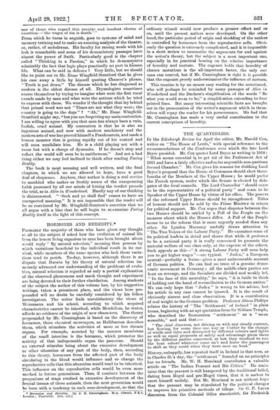HORMONES AND HEREDITY.*
PROBABLY the majority of those who have given any thought at all to the subject if asked how the evolution of animal life from the lowest living.organism to man has been brought about would reply By natural selection," meaning that process by which variations beneficial to the individual result in its sur- vival, while members of the same species who lack these varia- tions tend to perish. To-day, however, although there is no dispute that Darwin by his theory of natural selection im- monsely advanced our understanding of the problems of evolu- tion, natural selection is regarded as only a partial explanation of the observed phenomena and much thought and experiment are being devoted to their further elucidation. Among students of the subject the author of this volume has, by his suggestive writings, taken a prominent place, and the views here pro- pounded will no doubt be carefully considered by his fellow investigators. The writer finds unsatisfactory the views of Weissmann and his school, according to which acquired characteristics cannot be inherited, while Mendelisna, he states, affords no evidence of the origin of new characters. The theory propounded by Mr. Cunningham is based on the discovery of hormones, those chemical messengers, as Halliburton describes them, which stimulate the activities of more or less distant organs. For example, secreted by the mucous membrane of the small intestine is the hormone, which promotes the activity of that indispensable organ the pancreas. Should an external stimulus bring about the excessive development or other alteration of any part of the body, then, according to this theory, hormones from the affected part of the body circulating in the blood would influence and so change the reproductive cella,that this alteration would tend to be inherited. This influence on the reproductive cells would be even more marked in future generations. Thus, if combats between the progenitors of stags resulted in ecccessive. development of the frontal tissues; of these animals, then the next generation, would be born with a tendency. to such• over-development, so that the • Hormones and Heredity. By J. T. Cunningham. M.A. (Oxon). F.Z.S. London : Constable. (24s. net.]
ordinary stimuli would now- produce a- greater . effect and sto on, until the present antlers were developed. On the other hand, the particular period of origin and shedding of the antlers is controlled by hormones from the reproductive cells. Obvi, ously the question is extremely complicated, and it is impossible in a short review to summarize the arguments for and against the writer's theory, but the subject is a most important one, especially in its practical bearing on the relative importance of heredity and nurture. The eugenist holds that heredity of chance mutations is the all-important factor, the only one man can control, but if Mr. Cunningham is right it is possible that the eugenist grossly underestimates the influence of nurture.
This treatise is by no means easy reading for the uninitiated; who will perhaps be reminded by many passages of Alice in Wonderland and the Duchess's simplification of the words " Be what you would seem to be," a simplification extending to four printed lines. But many interesting scientific facts are brought out in the presentation of the writer's argument which in them- selves will repay the reader for his perseverance. We feel that Mr. Cunningham has made a very useful contribution to the current conceptions of heredity.


































 Previous page
Previous page